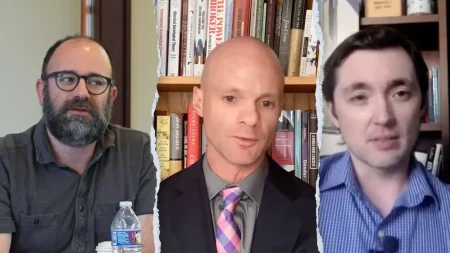The legal proceedings against Michael Jeffries, the 80-year-old former CEO of Abercrombie & Fitch, have taken a significant turn with the emergence of questions surrounding his mental competency. Jeffries, who is facing federal charges of sex trafficking and interstate prostitution, is now the subject of a potential competency hearing scheduled for June. His defense team asserts that he may be suffering from dementia, potentially including Alzheimer’s disease and Lewy body dementia, significantly impairing his ability to participate in his own defense. This development adds a complex layer to the already high-profile case, raising questions about Jeffries’ culpability and the future of the legal proceedings.
The defense’s argument centers around a neuropsychological evaluation conducted in October, which concluded that Jeffries likely suffers from dementia with behavioral disturbance, possibly encompassing both Alzheimer’s and Lewy body dementia. This diagnosis, if confirmed, would have profound implications for the case. The neuropsychologist’s findings indicate that Jeffries exhibits cognitive impairments, including memory problems, reduced attention span, slow processing speed, and a tendency toward confusion. These impairments, according to the defense, render Jeffries incapable of effectively assisting his legal counsel, a fundamental right guaranteed by the American justice system. The defense argues that if Jeffries cannot understand the charges against him, consult with his lawyers, or assist in preparing his defense, a fair trial is impossible.
The prosecution, while not commenting directly on Jeffries’ mental state, has agreed to participate in the competency hearing. This suggests an acknowledgment that the defense’s claims regarding Jeffries’ cognitive abilities warrant serious consideration. The two-day hearing in June will feature testimony from experts who have evaluated Jeffries, providing the presiding judge with the necessary information to make a determination on his competency. This hearing will essentially decide whether Jeffries is mentally fit to stand trial, a critical juncture in the legal process. The outcome will determine whether the case proceeds as planned or takes a different course, potentially involving alternative legal pathways depending on the severity of any confirmed cognitive impairment.
The allegations against Jeffries are serious, painting a picture of exploitative behavior involving vulnerable young men. Prosecutors allege that Jeffries, along with his romantic partner and another associate, lured men into drug-fueled sex parties with the promise of modeling opportunities for Abercrombie & Fitch. These parties, allegedly occurring between 2008 and 2015, reportedly took place in various locations, including the Hamptons, New York City, and even international destinations like England, France, Italy, Morocco, and St. Barts. The indictment outlines accusations of coercion and manipulation, with claims that the men were instructed to wear costumes, use sex toys, and submit to painful medical procedures. These allegations, if proven, depict a pattern of predatory behavior leveraging the allure of the Abercrombie & Fitch brand to exploit aspiring models.
Jeffries, who left Abercrombie & Fitch in 2014 after more than two decades at the helm, had cultivated a specific image for the brand, emphasizing a preppy, all-American aesthetic often featuring shirtless male models. This marketing strategy, while commercially successful for a period, also drew criticism for its objectification of men and its contribution to unrealistic body image standards. The current allegations against Jeffries cast a dark shadow over his legacy, raising questions about the potential intersection between his professional life and the alleged private misconduct. The accusations of exploiting aspiring models, particularly within the context of the brand’s highly sexualized marketing, create a disturbing narrative of power imbalance and potential abuse.
The upcoming competency hearing presents a significant legal challenge for both the defense and the prosecution. The defense will need to convince the judge that Jeffries’ cognitive decline is severe enough to preclude his participation in a trial. This may involve presenting medical evidence, expert testimony, and possibly even accounts from individuals familiar with Jeffries’ behavior. Meanwhile, the prosecution will likely seek to demonstrate that Jeffries retains sufficient mental capacity to understand the proceedings and assist in his defense. This could involve presenting counter-evidence from their own experts or challenging the validity of the defense’s assessments. The judge’s decision will ultimately rest on a careful evaluation of the evidence presented, balancing the need for justice with the defendant’s right to a fair trial. The outcome of this hearing will not only determine the course of this particular case but may also have broader implications for how the legal system addresses cases involving defendants with cognitive impairment.










